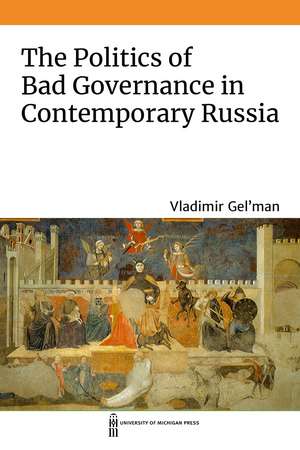The Politics of Bad Governance in Contemporary Russia
Autor Vladimir Gel'manen Limba Engleză Paperback – 15 noi 2022
| Toate formatele și edițiile | Preț | Express |
|---|---|---|
| Paperback (1) | 198.89 lei 3-5 săpt. | +12.02 lei 7-13 zile |
| UNIVERSITY OF MICHIGAN PRESS – 15 noi 2022 | 198.89 lei 3-5 săpt. | +12.02 lei 7-13 zile |
| Hardback (1) | 452.52 lei 3-5 săpt. | +19.27 lei 7-13 zile |
| UNIVERSITY OF MICHIGAN PRESS – 14 noi 2022 | 452.52 lei 3-5 săpt. | +19.27 lei 7-13 zile |
Preț: 198.89 lei
Nou
Puncte Express: 298
Preț estimativ în valută:
38.06€ • 39.73$ • 31.50£
38.06€ • 39.73$ • 31.50£
Carte disponibilă
Livrare economică 15-29 martie
Livrare express 01-07 martie pentru 22.01 lei
Preluare comenzi: 021 569.72.76
Specificații
ISBN-13: 9780472055623
ISBN-10: 0472055623
Pagini: 238
Ilustrații: 9 figures, 4 tables
Dimensiuni: 152 x 229 x 15 mm
Greutate: 0.31 kg
Editura: UNIVERSITY OF MICHIGAN PRESS
Colecția University of Michigan Press
ISBN-10: 0472055623
Pagini: 238
Ilustrații: 9 figures, 4 tables
Dimensiuni: 152 x 229 x 15 mm
Greutate: 0.31 kg
Editura: UNIVERSITY OF MICHIGAN PRESS
Colecția University of Michigan Press
Notă biografică
Vladimir Gel’man is Professor at the European University at St. Petersburg and University of Helsinki.
Cuprins
List of Figures
List of Tables
Preface and Acknowledgements
Chapter 1. The Politics of Bad Governance – A Framework for Analysis
Chapter 2. Post-Soviet Bad Governance: A Vicious Circle?
Chapter 3. Authoritarian Modernization: Illusions and Temptations
Chapter 4. Opportunities and Constraints: Policy Reforms in the 2000s
Chapter 5. The Technocratic Traps of Policy Reforms
Chapter 6. Success Stories amid Bad Governance
Chapter 7. The Politics of Bad Governance: Russia in Comparative Perspective
References
List of Tables
Preface and Acknowledgements
Chapter 1. The Politics of Bad Governance – A Framework for Analysis
Chapter 2. Post-Soviet Bad Governance: A Vicious Circle?
Chapter 3. Authoritarian Modernization: Illusions and Temptations
Chapter 4. Opportunities and Constraints: Policy Reforms in the 2000s
Chapter 5. The Technocratic Traps of Policy Reforms
Chapter 6. Success Stories amid Bad Governance
Chapter 7. The Politics of Bad Governance: Russia in Comparative Perspective
References
Recenzii
“Vladimir Gel’man’s new book provides a brilliant analysis of the evolution of Russian political institutions in the last thirty years as well as a rigorous discussion of the scenarios for escaping the authoritarian trap. While the book is based on recent research in political science, it is written for a general audience who wants to understand the past, the present, and the future of Russian politics.”
—Sergei Guriev, Sciences Po, Paris
—Sergei Guriev, Sciences Po, Paris
“In 2022, the whole world was astonished by Russia's invasion of Ukraine—not only by the criminality of the aggressive war, but by the sheer incompetence of the decision-making that led Putin's government to it. Vladimir Gel'man's The Politics of Bad Governance in Contemporary Russia explains how bad governance became the dominant and stable mode of operation in Putin's Russia, stripped the country of chances to grow and develop, and ultimately resulted in a corrupt, inefficient, poorly informed system of government that made the war possible.”
—Konstantin Sonin, University of Chicago
—Konstantin Sonin, University of Chicago
“Gel’man has long been one of the most original voices on Russian politics and his lively prose and vivid analogies are on full display in The Politics of Bad Governance in Contemporary Russia. By reframing the study of governance, Gel’man helps us understand why the Russian state usually, but not always, underperforms. An important work that will be required reading for anyone interested in governance or Russian politics.”
—Timothy M. Frye, Columbia University
—Timothy M. Frye, Columbia University
“At a time when Russia's unprovoked invasion of Ukraine has drawn renewed global attention to the inner workings of Putin's regime, Vladimir Gel'man has provided the best account yet of just why Russia's state institutions—despite decades of attempted reform after the Soviet collapse—still perform so poorly. Gel'man's detailed analysis shows clearly that bad governance in Russia was not the foreordained result of past historical legacies or cultural patterns, but rather a product of the self-interested choices of predatory elites. Anyone wanting to understand the domestic sources of Putinism simply must read this book.”
—Stephen E. Hanson, William Mary College
—Stephen E. Hanson, William Mary College
“This powerful new book persuasively explains why contemporary Russia, like many other countries in the world, suffers from bad governance. For Gel’man, bad governance is neither an inevitable consequence of problematic institutional legacies nor a regrettable failure of elite attempts to govern well. Instead, bad governance represents a purposeful, self-serving, and perverse success story for Russia’s authoritarian elites.”
—Juliet Johnson, McGill University
—Juliet Johnson, McGill University
“In this engaging work, Gel'man challenges long-standing ideas about good governance, why Russia has bad governance, and the assumption that governance in Russia may improve. In doing so, he presents us with an enormously valuable and timely perspective about how we should think about Russian politics today.”
—Sarah Wilson Sokhey, University of Colorado Boulder
—Sarah Wilson Sokhey, University of Colorado Boulder
“An original contribution to the study of Russian governance, rent-seeking, state building, and regime change. This is a serious piece of scholarship assessing the development of Russia’s political system in the post-Communist era, offering valuable insights into how and why Russia, despite its high level of economic development, exhibits so many features of bad governance, such as weak rule of law, near-universal rent-seeking, corruption, poor regulation, and government ineffectiveness.”
—Hilary Appel, Claremont McKenna College
—Hilary Appel, Claremont McKenna College
"Gel’man (European Univ., St. Petersburg, Russia) makes a persuasive argument that the main characteristic of the post-Soviet Russian political system is 'bad governance.' . . . Recommended."
—Choice
—Choice
"The Politics of Bad Governance is an important contribution to Russian politics and policy, and authoritarian and comparative politics more generally."
Descriere
Human history is in reality a history of corrupt governments
